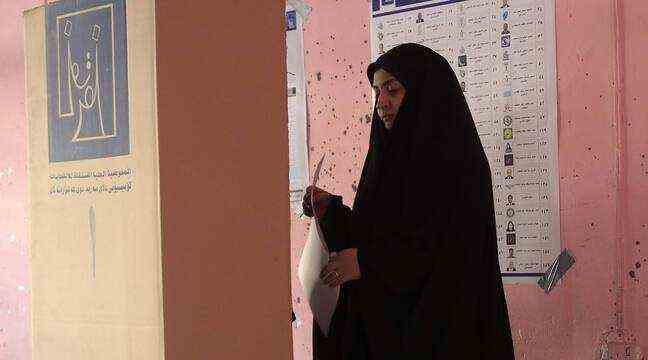The polling stations opened this Sunday in Iraq for early legislative elections. Between rampant corruption and the plethora of armed factions, voters don’t expect much change. In the center of Baghdad, at the opening around 7 am of a polling station installed in a school, few were still the voters to have made the trip. A major security device has been deployed in the capital and at the entrance to polling stations, where voters will have to be searched twice before they can enter.
The offices will close at 6 p.m. unless there is an extension. Dozens of international observers dispatched by the UN and the European Union will oversee the process. From the opening, Prime Minister Moustafa al-Kazimi voted in a polling station in the ultra-secure green zone of Baghdad. “This is an opportunity for change,” he said, calling out to Iraqis and “those who hesitate”. “Get out there and vote, change your reality, for Iraq and for your future,” he added. “Vote, vote, vote”, he hammered.
Record abstention expected
But experts are already predicting a record abstention. Initially scheduled for 2022, the elections were brought forward to calm the protest of the fall of 2019, an expression of immense popular fed up with sprawling corruption, failing public services and a failing economy. Suppressed in the blood (at least 600 dead and 30,000 injured), the movement has since run out of steam. Dozens of activists have been victims of kidnappings, assassinations and attempted assassinations blamed on influential pro-Iran armed factions. Describing this undemocratic context, protest activists largely boycotted the ballot.
The ballot will take place under high security, in a country where Daesh remains active. As all or almost all political parties have their own armed factions, the fear of electoral violence and fraud is on everyone’s mind. Some 25 million voters are called to the polls to elect 329 deputies by uninominal ballot. The preliminary results are expected within twenty-four hours after the closing of the polling stations and the final results in ten days, according to the electoral commission.
Moqtada al-Sadr big favorite
The Sadrist current is given a big favorite. Its leader, the sulphurous Moqtada al-Sadr, ex-militia leader with anti-American rhetoric, already holds the largest block in the outgoing Parliament. But he will have to deal with the great pro-Iran rivals of Hashd al-Chaabi, who entered parliament for the first time in 2018, riding the victory against the jihadists of Daesh. If the political scene remains polarized on the same sensitive issues – whether it is the presence of American troops or the influence of the big Iranian neighbor – the parties will begin very long negotiations to agree on a new prime minister, a position which traditionally returns to a Shia Muslim.
“The election will likely give birth to another fragmented Parliament. Opaque haggling will follow among the different factions to form the next government, ”summarize researchers Bilal Wahab and Calvin Wilder in an analysis published by the Washington Institute. Difficult to see in this election “more than a game of musical chairs”, they add. And the demands of the protest – the fight against corruption, job creation, making armed groups accountable – “have little chance of being met”.

